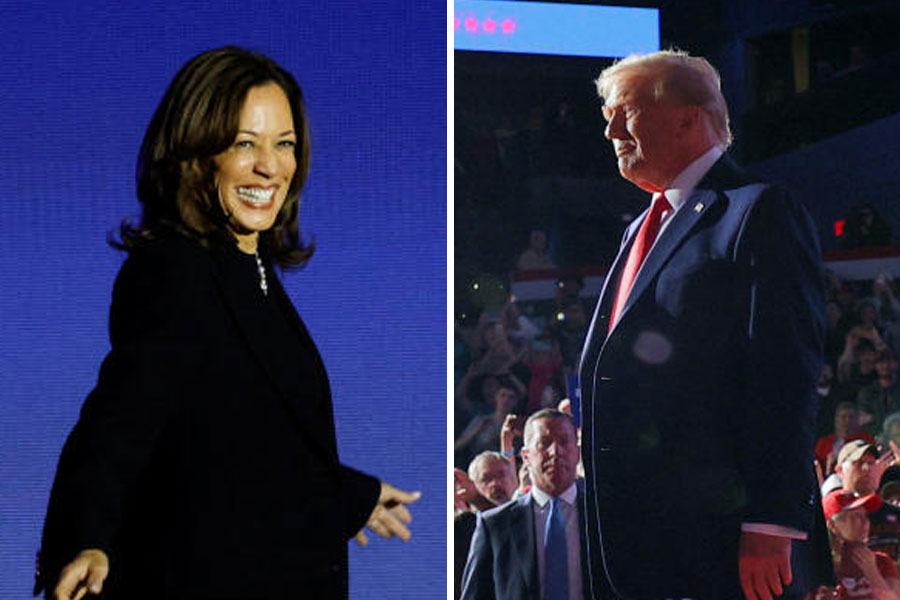Donald J. Trump and Kamala Harris closed out their campaigns in the final hours before Election Day in starkly different moods: The former President, often appearing drained at arenas that were not filled, claimed that the country was on the brink of ruin, while the vice-president promised a more united future as energised supporters chanted alongside her, “We’re not going back.”
In stop after stop, the presidential rivals essentially offered up two competing versions of reality on Monday and into early Tuesday. Trump repeatedly raised the spectre of unchecked immigration and the dangers of Democratic policies as he spoke to crowds in North Carolina and Pennsylvania before closing with a midnight rally in Michigan.
With a comparatively more optimistic message, Harris crisscrossed Pennsylvania, which holds 19 electoral votes that could decide the race. Stopping in Scranton, Allentown and Pittsburgh before a nighttime rally in Philadelphia, Harris talked about bolstering the economy and restoring federal abortion rights.
“America is ready for a fresh start,” she said to supporters on a college campus in Allentown, “where we see our fellow Americans not as an enemy but as a neighbour.”
About 48km to the southwest, Trump was in Reading, Pennsylvania, broadly portraying undocumented immigrants as mentally ill criminals and calling those accused of crimes “savages” and “animals”.
Both leaned on Hispanic supporters as they tried to rally Latino voters. The pro-Harris rapper Fat Joe, who is Puerto Rican, practically shamed his fellow Latinos in Allentown as he asked, “Where’s your pride?” Trump, still facing fallout from his rally in New York at which a comedian called Puerto Rico a “floating island of garbage”, brought Roberto Clemente Jr, the son of the Puerto Rican baseball legend, to the stage at a rally in Pittsburgh.
But Trump, reaching the end of a gruelling marathon of a campaign that began in 2022, looked visibly weary, battling fatigue in front of listless crowds, though he was relatively more upbeat and energised in Michigan. Harris, still appearing fresh after a three-month sprint, appealed for unity and pressed the contrast to her rival without uttering his name.
“The measure of a true leader is based not on who you beat down,” she said. “It is based on who you lift up.”
Despite the sharply different tones, polls suggest the race remains tight, with the final New York Times/Siena College surveys showing the candidates tied or holding only narrow leads in all of the seven battleground states.
It was, without doubt, going to be an arduous day for two candidates intent on making history. Trump, who hopes to become the first President in more than 120 years to return to office after an electoral defeat, headed to Pittsburgh after his Reading rally. He did not take the stage in Grand Rapids, Michigan, where he has held the closing rally of each of his campaigns, until after midnight.
Before Allentown, Harris, who hopes to make even loftier history as America’s first female President, began a door-knocking effort in Scranton. Her running mate, governor Tim Walz of Minnesota, was campaigning in Wisconsin and Michigan. To cover more ground virtually, their campaign simulcast rallies from the battleground states featuring top surrogates and musical performers, with crowds looking to big screens to see what was happening in other cities.
Trump seemed well aware of the work ahead. “You know we’re going to be doing four of these today, four,” he told a rally audience in Reading that slowly decreased in size through his 80-minute speech. “They’re big ones.”
His day started in Raleigh, the capital of North Carolina, which he won in 2020 but where the latest Times/Siena poll showed Harris with a slight edge.
New York Times News Service











